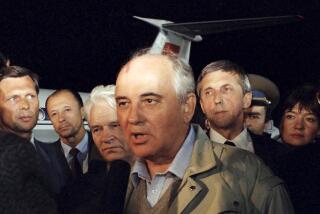Signal-Readers Forget That Our Own Are Harsh
- Share via
In analyzing the changes in the Soviet Politburo, Americans have focused almost exclusively on their effect on Mikhail S. Gorbachev’s power. Yet the effects on Soviet foreign policy are likely to be far more important--and far more ominous--for the United States.
The two leading proponents of an American-centered policy--Andrei A. Gromyko and Anatoly F. Dobrynin--have been removed from the leadership. Alexander N. Yakovlev--a man who has taken a bitterly anti-American line in print and has advocated a policy centered on Europe and Japan--has become chairman of the Politburo’s foreign-policy committee.
The appointment of Vladimir Kryuchkov as chairman of the KGB probably has a similar meaning. Kryuchkov was one of Yuri V. Andropov’s closest subordinates for 25 years. It was Andropov who brought Yakovlev back to Moscow from exile as ambassador to Canada in 1983, and it was Andropov who in his last public statement said that only a naive person would believe that the Soviet Union could deal with the United States.
Americans tend to be very self-centered in their view of foreign policy. They continue to speak of testing Gorbachev before making concessions and of demanding that he pay a price before being admitted as a participant in specific politics. They forget that the Soviet Union has also been testing the United States. In Soviet eyes we have failed the test, and the Soviet Union is now going to strongly emphasize relations with Western Europe, China and Japan.
In fact, Soviet relations with China are already improving rapidly and Gorbachev may well go there next year. He will visit West Germany this month. He is anxious to get relations with Japan off dead center.
At the same time, the strategic arms-reduction talks with the United States seem to be going nowhere. The Soviet Union is toughening its position on Afghanistan, and probably will not withdraw its troops completely so long as arms continue to be supplied to the rebels. In his acceptance speech Saturday, Gorbachev emphasized the code words for supporting radical Third World clients: the right of people to choose their own form of government. The regional issues are unlikely to be resolved and may well heat up.
American liberals are inclined to think that U.S. gestures of accommodation will reduce Soviet insecurity and lead to a more accommodating Soviet policy. Conservatives think that accommodation will be interpreted as American weakness and will encourage Soviet aggression.
The same debate has gone on in the Soviet Union. The Soviet Union has made a number of concessions, some of them very major: acceptance of the zero option on intermediate-range nuclear forces, acceptance of arms-control verification proposals, an offer of asymmetrical troop reductions in Europe, the withdrawal from Afghanistan.
The result has not been encouraging from Moscow’s perspective. The Reagan Administration has made almost no concessions on START and hasn’t even responded to Soviet proposals on conventional troop reduction. It has kept pressure up on Soviet Third World clients, including supplying arms to Afghan rebels in violation of its written guarantees not to do so. It has taken no steps to relax trade restrictions with the Soviet Union. And President Reagan has continued to emphasize his desire for an anti-communist revolution in the Soviet Union.
Worst of all from a Soviet perspective, President Reagan’s hard-line policy has not even been an issue in the American presidential race. Michael S. Dukakis, the Democratic candidate, has said that his policy would be more like President Reagan’s than one proposed by Republican George Bush. And with all of Dukakis’ talk about strengthening our conventional forces and testing the Soviet Union, he is probably right. In fact, Americans have interpreted Soviet concessions as a sign of weakness. They have exaggerated the weakness of Gorbachev’s domestic position within the Politburo and exaggerated the weakness of his international position. They think that they have Gorbachev in a box, when he actually has many different options.
In many respects, the United States and the Soviet Union have similar interests today. Both need to divert money from defense to investment. Both need to reduce governmental regulation of trade abroad and subordinate political goals in that realm to economic growth. Cooperation with the Soviet Union on troop reductions in Europe and relaxation of restrictions on trade with the Soviet Union are thus fully in the American interest.
Yet by foolishly exaggerating Gorbachev’s weakness, the United States has forced him to play on East-West conflicts more than he would actually like. If it responds rigidly to his new moves toward Western Europe, China and Japan, the United States has the potential of creating utter disaster for itself in the international arena.
More to Read
Sign up for Essential California
The most important California stories and recommendations in your inbox every morning.
You may occasionally receive promotional content from the Los Angeles Times.













